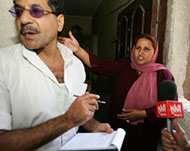Egypt frees chemist in UK bomb probe
The Egyptian authorities have released an Egyptian chemist detained for questioning following the 7 July bombings in London, saying he has been cleared of suspicion.

Magdy el-Nashar had been sought by Britain in connection with the 7 July attacks in London, which killed 56 people including the four bombers in explosions on London‘s Underground and on a bus.
El-Nashar, 33, was studying at Leeds University, England, and the British government suspected him of links to some of the four bombers, three of whom were from Leeds.
El-Nashar had returned to Egypt on holiday a week before the attacks.
The Egyptian authorities arrested him several days after the bombings, and officials from Scotland Yard travelled to Egypt to attend his questioning.
An official from the Interior Ministry’s media office said he was released on Tuesday after the authorities found no evidence against him and no links to the attacks or to al-Qaida.
Extradition
“There is nothing against him,” the official said when asked whether el-Nashar would be extradited to Britain.
Egypt had previously said it would not hand him over. A spokeswoman for London‘s Metropolitan Police had no comment on the release, saying it was a matter for the Egyptian authorities.
The force has previously said it was cooperating closely with Egypt after the 7 July attacks but has not identified el-Nashar as a suspect.
Surprise
El-Nashar returned to his home in the Cairo neighbourhood of Basatin before dawn to the surprise of his family, who had not been informed of his release.
 |
|
El-Nashar’s neighbours cheered |
“We heard the knock at the door, and his father went down to answer. He started screaming, ‘Magdy! Magdy is here!” said his mother, Umm Magdy, with tears in her eyes. “You can imagine, a mother’s heart when her son comes in after what happened.”
She said that she had been able to speak to him only once by telephone since his detention and that the family had not been allowed to visit him.
“My heart was torn every day. I was not eating or sleeping. Since he was taken, I have felt there was a knife stuck in my heart,” she said.
“I was always sure of his innocence, but I was always afraid of the unknown.”
El-Nashar’s neighbours gathered outside the house, cheering his release and ululating.
“He is in good health, thank God,” el-Nashar’s younger brother, Muhammad al-Nashar, said. “There were never any charges against him.”
But his mother insisted: “I will not let him go to London now unless the British government officially announces he is innocent the same way they accused him.”
Doctorate in chemistry
El-Nashar had completed his doctorate in biochemistry at Leeds when the attacks occurred and had returned to Egypt to submit his certification to the government research centre that sponsored his studies in Britain.
He told his interrogators that he had intended to return to Leeds.
At the time of the bombings, British media reported that traces of TATP, used by bomber Richard Reid who failed in 2001 to blow up an aeroplane with explosives in his shoes, were found in el-Nashar’s apartment during raids in Leeds.
But the reports were never confirmed.